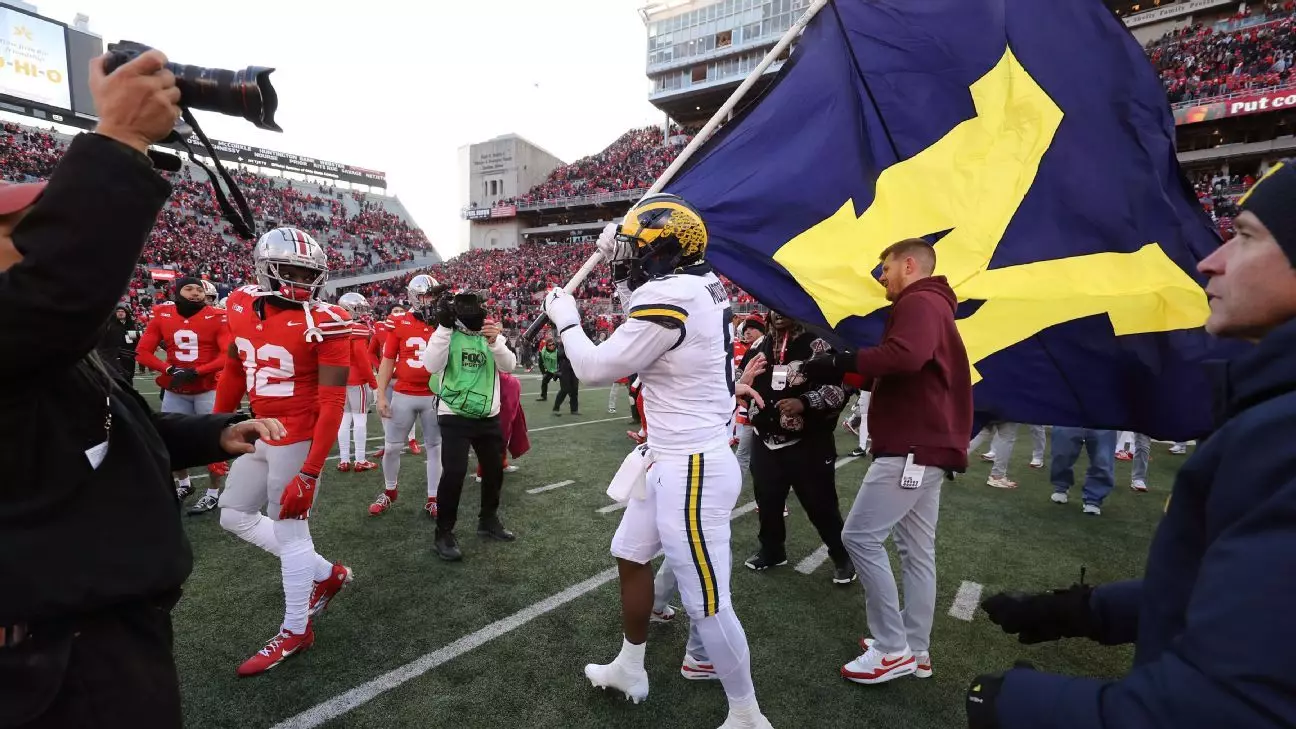The storied college football rivalry between the University of Michigan Wolverines and the Ohio State Buckeyes is famous for more than just spectacular gameplay; it is also known for its intensity and fervor. However, the explosive nature of that rivalry escalated to an unprecedented level during a recent matchup that concluded with a shocking outcome. Michigan, a team initially considered heavy underdogs, pulled off a stunning upset against the second-ranked Buckeyes with a narrow 13-10 victory. What followed was a disturbing incident that underscored the sometimes toxic atmosphere surrounding such competitive events.
In the aftermath of their victory, Michigan players chose to celebrate by planting their flag at midfield in The Horseshoe, a gesture that many Ohio State fans interpreted as a massive provocation. This act sparked an immediate and violent altercation on the field. Riotous scenes erupted as players from both teams clashed, throwing punches, and the referee’s whistle was drowned out by the chaos. What should have been a moment of celebration turned into chaos, driven by emotions that spiraled out of control.
Coaches and athletic department officials, representing both universities, attempted to intervene. Yet their efforts were largely unsuccessful as emotions continued to flare. Buckeyes coach Ryan Day accused the Wolverines of triggering the conflict, emphasizing an inherent pride within his team and demonstrating how competitive spirits can override sportsmanship.
The intensity of the brawl prompted the involvement of law enforcement. Officers from multiple agencies had to intervene to separate the two squads, applying pepper spray to disperse the chaos and stabilize the situation. Injuries were reported on both sides, including one officer who required medical attention, reflecting how deeply charged the incident was. The requirement for police intervention during a college football game highlights a troubling trend in sports, signaling a line that was crossed in terms of acceptable conduct.
Reflections on Sportsmanship
In the aftermath, both coaches expressed regret over how the incident unfolded. Wolverines head coach Sherrone Moore articulated a wish that better management could have been achieved during that moment. The reality that heated emotions can lead to regrettable outcomes is a lesson that resonates beyond the football field. Moore’s acknowledgment of the event as detrimental to the perception of college football invokes a broader discussion about sportsmanship, rivalry, and how the celebratory aspects of winning should never devolve into physical confrontation.
Player Reactions: Fighting and Classlessness
Players from both teams shared their perspectives, with Michigan’s Kalel Mullings calling the Buckeyes “classless” for their response after the game. He criticized the idea of resorting to physical confrontation after a hard-fought match, implying that this behavior reflects poorly on the sport as a whole. His sentiments resonate with many who view college athletics as a popular cultural cornerstone that should foster teamwork, respect, and camaraderie, rather than enmity.
This incident serves as a cautionary tale. Rivalries can ignite passion, but when that fire combusts into violence, it tarnishes the integrity of the sport and detracts from the athletes’ hard work and achievements. Mullings aptly pointed out that the fighting should have taken place during the game, indicating that the intensity expected from a competitive match should not spill over post-game.
The clash between Michigan and Ohio State highlights a crucial moment for reflection in the world of college athletics. As rivalries evolve, it is imperative for players, coaches, and officials to learn to handle their emotions with maturity and dignity. As sensational as moments like these can prove to be for headlines, it is essential for the sport to prioritize respect and sportsmanship.
Ultimately, this incident is not purely about the rivalry itself but serves as a reminder that in sports—like life—how one behaves after adversity speaks volumes about character. While rivalries will always ignite passion and fervor, it is incumbent upon everyone involved to uphold the spirit of the game, preserving the essence of competition, camaraderie, and respect for both the sport and each other.


Leave a Reply